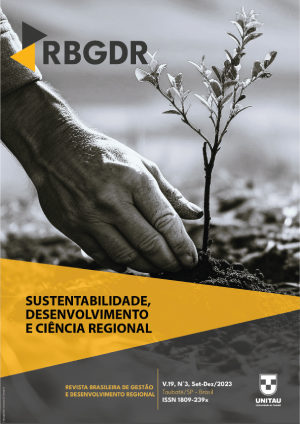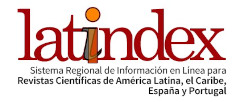IN PURSUIT OF A MORE HOLISTIC, CITIZEN-CENTERED RESILIENCE STRATEGY: THE CASE OF PORTO ALEGRE, BRAZIL
DOI:
https://doi.org/10.54399/rbgdr.v19i3.6323Keywords:
Resilience, Resilient City, 100 Resilient Cities, Urban Sustainability, Porto AlegreAbstract
The concept of resilience is particularly applicable to urban planning if the complexity and various interconnected systems of a city are considered. The city of Porto Alegre has long been studied in academic circles for its tradition of citizen participation in local decision-making. Porto Alegre recently embarked on the development and implementation of a resilience strategy under Rockefeller's Foundation 100 Resilient Cities Project umbrella. This article uses descriptive exploratory methods to document the development and implementation of a Porto Alegre resilience strategy, which relied on the city's previous success in implementing innovative participatory methods. The institutionalization and regulatory frameworks necessary for the implementation of resilience strategies were also documented, uncovering a tripod of resilience that articulates relationships between civil society, government, and academia to achieve a successful implementation.
References
APPLER, Douglas; RUMBACH, Andrew. Building community resilience through historic preservation. Journal of the American Planning Association, v. 82, n. 2, p. 92-103, 2016.
BURNSIDE-LAWRY, Judy; CARVALHO, Luis. A stakeholder approach to building community resilience: awareness to implementation. International Journal of Disaster Resilience in the Built Environment, 2016.
CÉLÉRIER, Laure; BOTEY, Luis Emilio Cuenca. Participatory budgeting at a community level in Porto Alegre: a Bourdieusian interpretation. Accounting, Auditing & Accountability Journal, 2015.
CHARMAZ, Kathy. Constructing grounded theory: A practical guide through qualitative analysis. SAGE, 2006.
CHELLERI, Lorenzo. From the «Resilient City» to Urban Resilience. A review essay on understanding and integrating the resilience perspective for urban systems. Documents d'anàlisi geogràfica, v. 58, n. 2, p. 287-306, 2012.
CONTI, Diego de Melo; GUEVARA, Arnoldo Jose de Hoyos; HEINRICHS, Harald; SILVA, Luciano Ferreira; QUARESMA, Cristiano Capellani; BETÉ, Thiago Souza. Collaborative governance towards cities sustainability transition. Revista Brasileira de Gestão Urbana, v.11, 2019.
CRESWELL, John W. (2017). Research design: Qualitative, quantitative, and mixed methods approaches. SAGE publications, 2017.
FRIESE, Susanne. Qualitative data analysis with ATLAS. ti. SAGE publications, 2019.
FU, Yang; ZHANG, Xiaoling. Trajectory of urban sustainability concepts: A 35-year bibliometric analysis. Cities, v. 60, p. 113-123, 2017.
GODSCHALK, David R. Urban hazard mitigation: creating resilient cities. Natural hazards review, v. 4, n. 3, p. 136-143, 2003.
HARUNA, Ayisha Ida; OPPONG, Rexford Assasie; MARFUL, Alexander Boakye. Exploring eco-aesthetics for urban green infrastructure development and building resilient cities: A theoretical overview. Cogent Social Sciences, v. 4, n. 1, p. 1478492, 2018.
HERNANTES, Josune; MARAÑA, Patricia; GIMENEZ, Raquel; SARRIEGI, Jose Mari; LABAKA, Leire. Towards resilient cities: A maturity model for operationalizing resilience. Cities, v. 84, p. 96-103, 2019.
HUSSEIN, Ashatu. The use of triangulation in social sciences research: Can qualitative and quantitative methods be combined. Journal of comparative social work, v. 1, n. 8, p. 1-12, 2009.
IBGE. Cidades e Estados. Porto Alegre, 2010. Retrieved from <https://www.ibge.gov.br/cidades-e-estados/rs/porto-alegre.html> Accessed January 8, 2021.
JABAREEN, Yosef. Planning the resilient city: Concepts and strategies for coping with climate change and environmental risk. Cities, v. 31, p. 220-229, 2013.
JAYANTHAN, Aparna Santha; SINGH, Wafa. Governance and citizenship: Final Report. PRIA and University of Victoria, 2016.
KLEIN, Bernhard; KOENIG, Reinhard; SCHMITT, Gerhard. Managing urban resilience. Informatik-Spektrum, v. 40, n. 1, p. 35-45, 2017.
KRELLENBERG, Kerstin; KOCH, Florian; KABISCH, Sigrun. Urban sustainability transformations in lights of resource efficiency and resilient city concepts. Current opinion in environmental sustainability, v. 22, p. 51-56, 2016.
LEICHENKO, Robin. Climate change and urban resilience. Current opinion in environmental sustainability, v. 3, n. 3, p. 164-168, 2011.
LEITNER, Helga; SHEPPARD, Eric; WEBBER, Sophie; COLVEN, Emma. Globalizing urban resilience. Urban Geography, v. 39, n. 8, p. 1276-1284, 2018.
LIU, Wei; SONG, Zhaoyang. Review of studies on the resilience of urban critical infrastructure networks. Reliability Engineering & System Safety, 2020.
MALALGODA, Chamindi; AMARATUNGA, Dilanthi; HAIGH, Richard. Overcoming challenges faced by local governments in creating a resilient built environment in cities. Disaster Prevention and Management: An International Journal, 2016.
MEEROW, Sara; NEWELL, Joshua P. Urban resilience for whom, what, when, where, and why?. Urban Geography, v. 40, n. 3, p. 309-329, 2019.
MENDIZABAL, Maddalen; HEIDRICH, Oliver; FELIU, Efren; GARCÍA-BLANCO, Gemma; MENDIZABAL, Alaitz. Stimulating urban transition and transformation to achieve sustainable and resilient cities. Renewable and Sustainable Energy Reviews, v. 94, p. 410-418, 2018.
MIERZEJEWSKA, Lidia; WDOWICKA, Magdalena. City resilience vs. resilient city: Terminological intricacies and concept inaccuracies. Quaestiones Geographicae, v. 37, n. 2, p. 7-15, 2018.
PAIDAKAKI, Angeliki; MOULAERT, Frank. Does the post-disaster resilient city really exist?. International Journal of Disaster Resilience in the Built Environment, 2017.
PORTO ALEGRE. Guia Porto Alegre Resiliente. INOVAPOA, 2015. Retrieved from <http://lproweb.procempa.com.br/pmpa/prefpoa/inovapoa/usu_doc/guia_poa_resiliente-final.pdf> Accessed June 3, 2019.
PORTO ALEGRE. Estratégia de Resiliência de Porto Alegre, 2017. Retrieved from <https://resilientcitiesnetwork.org/downloadable_resources/Network/Porto-Alegre-Resilience-Strategy-Portuguese.pdf> Accessed June 3, 2019.
PORTO ALEGRE. Lei Nº 12.629 de 11/11/2019, institui o Plano de Resiliência Cezar Busatto no Município de Porto Alegre e dá outras providencias. Retrieved from <https://www.camarapoa.rs.gov.br/draco/processos/127212/Lei_12629.pdf> Accessed February 7, 2021.
PORTO ALEGRE. Lei Complementar Nº 872 de 10/01/2020, institui a Política de Sustentabilidade, Enfrentamento das Mudanças Climáticas e Uso Racional da Energia, cria o Programa de Premiação e Certificação em Sustentabilidade Ambiental de Porto Alegre e dá outras providências. Retrieved from <http://lproweb.procempa.com.br/pmpa/prefpoa/smam/usu_doc/leicomplementar__872.pdf> Accessed February 7, 2021.
ROCHA, Roberto. A gestão descentralizada e participativa das políticas públicas no Brasil. Revista pós ciências sociais, v. 6, n. 11, 2009.
ROCKEFELLER FOUNDATION. The city resilience framework. New York City: 2015.
RONZANI, Celia Maria; COSTA, Priscila Rezende da; SILVA, Luciano Ferreira da; PIGOLA, Angélica; PAIVA, Eliane Martins de. Qualitative methods of analysis: an example of Atlas. TIâ„¢ Software usage. Revista Gestão & Tecnologia, v. 20, n. 4, p. 284-311, 2020.
SALDAÑA, Johnny. The coding manual for qualitative researchers. sage, 2021.
SOUZA, Celso Fabricio Correia de; NETO, Josué Mastrodi; SOUZA, Celso Correia de; FRAINER, Daniel Massen. Índice social de desenvolvimento (ISD): cálculo para municípios da região metropolitana de Campinas/SP. Revista Ibero-Americana de Ciências Ambientais, v. 11, n. 1, p. 445-459, 2020.
SPAANS, Marjolein; WATERHOUT, Bas. Building up resilience in cities worldwide–Rotterdam as participant in the 100 Resilient Cities Programme. Cities, v. 61, p. 109-116, 2017.
VALE, Lawrence J. The politics of resilient cities: whose resilience and whose city?. Building Research & Information, v. 42, n. 2, p. 191-201, 2014.
Downloads
Published
How to Cite
Issue
Section
License
Copyright (c) 2023 Revista Brasileira de Gestão e Desenvolvimento Regional

This work is licensed under a Creative Commons Attribution-NonCommercial 4.0 International License.
Authors who have their papers accepted and published in the Brazilian Journal of Regional Management and Development must agree to the copyright policy CC BY https://creativecommons.org/licenses/by/4.0/.
If the article is accepted for publication, the copyright is automatically assigned to the Brazilian Journal of Regional Management and Development.

















